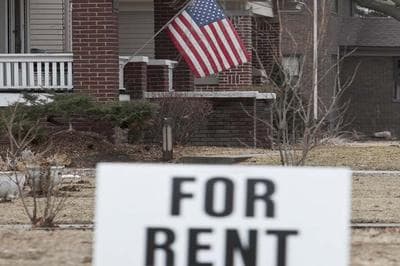Advertisement
The Rent Really Is Too High
ResumeAmerica’s rental crunch. Big buyers scoop up properties and our rents have gone sky-high.

Big report out in the last week spelling out what millions of Americans already know: rents in this country are skyrocketing. Digging deeper and deeper into incomes that are widely going nowhere. First the recession pushed millions out of home ownership and into the rental market. Next investors scooped up properties, including single-family homes, that went from owner-occupied homes to rental units. And rents just soared, as incomes have stagnated. People paying a third or half their income for a place to sleep. Or finding themselves unable and homeless. This hour On Point: the wild ride in the American rental market.
-- Tom Ashbrook
Guests
Diana Olick, real estate correspondent for CNBC. (@diana_olick)
Susan Wachter, professor of Real Estate and Financial Management at the University of Pennsylvania's Wharton School of Bussiness. Co-director of the Penn Institute for Urban Studies.
Chris Herbert, research director of the Joint Center for Housing Studies at Harvard Unversity. Was a lead author on "America's Rental Housing: Evolving Markets and Needs." (@Harvard_JCHS)
From Tom's Reading List
Harvard Joint Center for Housing Studies: America's Rental Housing — "Rental housing has always provided a broad choice of homes for people at all phases of life. The recent economic turmoil underscored the many advantages of renting and raised the barriers to homeownership, sparking a surge in demand that has buoyed rental markets across the country. But significant erosion in renter incomes over the past decade has pushed the number of households paying excessive shares of income for housing to record levels. Assistance efforts have failed to keep pace with this escalating need, undermining the nation’s longstanding goal of ensuring decent and affordable housing for all."
NPR: When Buying A Home Is Too Costly And The Rent Is Too Damn High — "In general, those who rent tend to make less money, which makes sense. A higher income means you have a better chance of saving up money for the down payment on a home and are more likely to qualify for a mortgage. "People of color are more likely to have lower incomes. And lower-income households have fared quite poorly [as rents have risen]," says Chris Herbert, the lead researcher on the project. The racial skew in the rental market underscores the wide disparities that remain in homeownership."
Wall Street Journal: Overseas Money Pours Into Miami Real Estate — "Miami is just a bigger example of a recent national tilt toward multifamily buildings—both apartments and condominiums—instead of the single-family homes that dominated during the bubble years leading up to the recession. While the majority of national construction is still of single-family homes, the recent rebound in construction activity—whether measured by new starts or permits—has been centered in multifamily buildings."
This program aired on December 16, 2013.